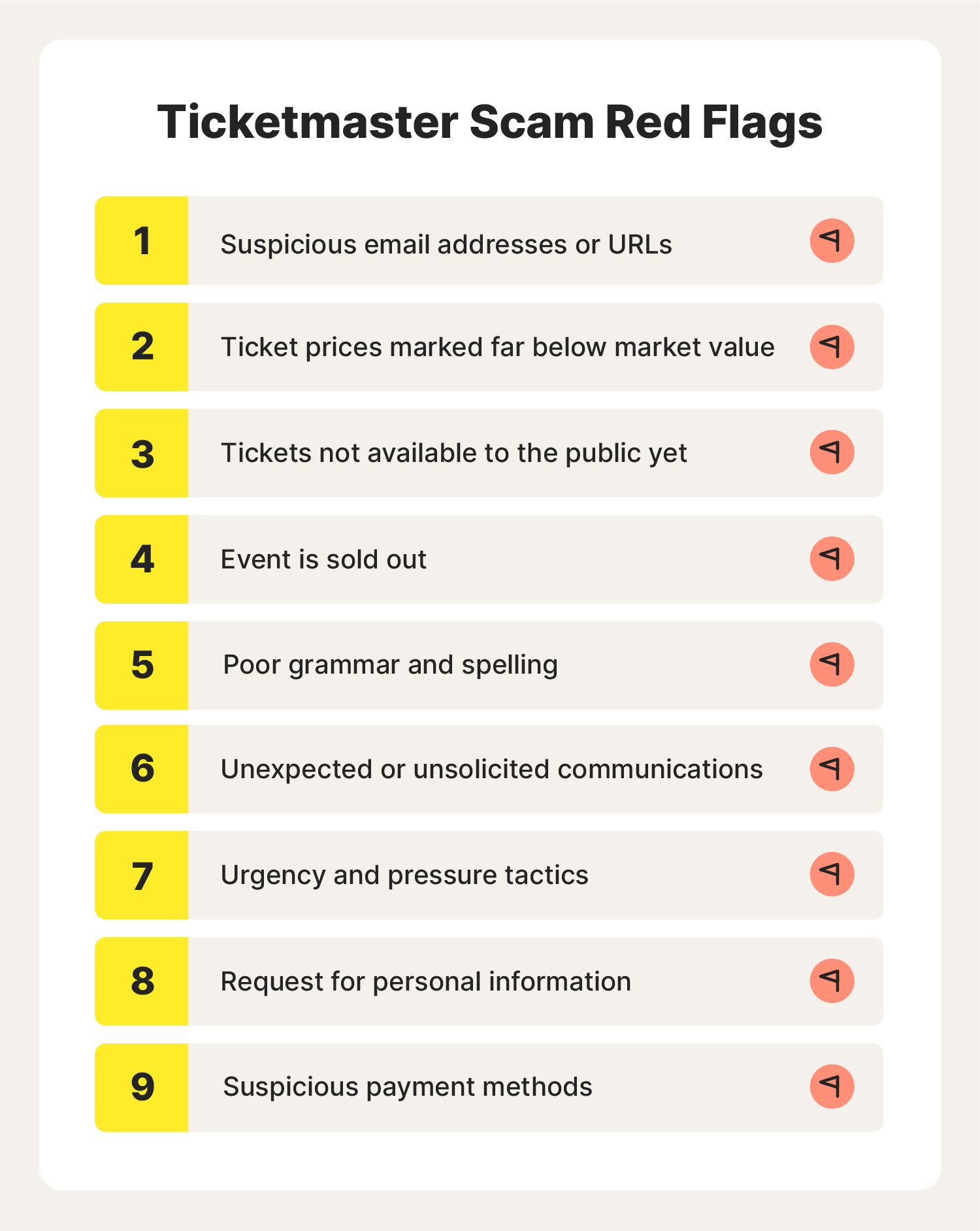10 Ticketmaster scams and how to spot them

There’s no worse feeling than showing up to an event you’ve been looking forward to only to be turned away at the door because someone sold you counterfeit tickets. Keep reading to learn how to protect yourself from Ticketmaster scams, recognize counterfeit ticket listings, and how Norton 360 Deluxe can help shield you from some of the most common ticket scams.
Following a surge in demand for live event tickets, Ticketmaster scams and ticket fraud have doubled since the beginning of 2022. Which is why the time is now to know how to avoid these Ticketmaster online scams.
Here, we’re breaking down 10 of the most common Ticketmaster scams to look out for, including:
- Fake “Ticketmaster” tickets
- Fake support numbers
- Third-party payment
- Phishing emails
- Sold-out tickets
- Lookalike websites
- Speculative ticketing
- Printed tickets
- “Vanishing” tickets
- Replicated tickets
Now, read on so you rock on with your regularly scheduled concert going.
1. Fake “Ticketmaster” tickets posted on third-party sites
Be wary of high-demand tickets priced well below market value. Scammers may try to rush buyers into purchasing by offering an unbelievable ticket deal over social media platforms or online marketplaces. They may even post photos of real Ticketmaster tickets and offer to meet you in person to sell them to convince you they’re real. But if the price seems too good to be true, it most likely is.
Here are a few telltale signs that a scammer is selling fake tickets:
- Other sellers are charging a much higher rate for the same ticket.
- The seller claims they’re a Ticketmaster agent (Ticketmaster will never sell tickets on third-party sites like Craigslist or Facebook Marketplace).
- The seller asks for payment via wire transfer or gift card.
How to protect yourself from fake ticket scams: Only purchase your event tickets from official sources, like the box office, or a primary ticketer like Ticketmaster.com. Double-check that the URL is correct and secure — scammers can replicate legitimate websites with a slightly tweaked URL to trick customers into believing they’re on the right site.
2. Fake support numbers
One of the sneakiest tricks scammers use to deceive unsuspecting customers into sharing personal information is deploying fake customer support numbers. Here’s how this Ticketmaster scam works:
- A scammer creates a spoofed website or online ad that appears legitimate, with a fake Ticketmaster support number prominently displayed.
- Once the website or ad is live, the scammer uses search engine optimization techniques to ensure their fake support numbers appear at the top of the page when customers search for Ticketmaster’s support number.
- When customers call the fake support number, the scammer poses as a genuine Ticketmaster support agent, adopting professional-sounding greetings and language to deceive the customer into trusting that they are a legitimate representative.
- Once they gain trust, the scammer will then try to extract sensitive information from the customer, such as their name, address, email address, username, and password to “help them” with whatever issue they called about.
- Once a scammer has access to your personal information, they can use it to attempt various fraudulent activities, like changing your Ticketmaster account credentials, making unauthorized purchases, or transferring funds from your linked payment method.
How to protect yourself from Ticketmaster fake support numbers: Always exercise extreme caution when searching for customer support numbers online—this is a common scam that cybercriminals also use with sites like eBay and Amazon. To ensure you connect with a verified agent, only call the support numbers listed on the official Ticketmaster website.
3. Third-party payment
Suppose someone is selling “Ticketmaster” tickets but is unwilling to complete the transaction on the official Ticketmaster website. In that case, they’re likely selling counterfeit tickets or never planning on delivering anything in the first place.
Scammers may request payment via unconventional methods like:
- Venmo
- Zelle
- Wire transfer
- Cryptocurrency
- Gift Cards
They may claim that it’s required to secure the tickets or offer better deals and discounts if payment gets made outside the Ticketmaster site, but it’s really to evade Ticketmaster’s security measures and avoid detection. Once payment occurs using one of these methods, it’s incredibly difficult for targets to recover their funds and hold the scammer accountable.
How to avoid third-party payment scams: Only purchase Ticketmaster Tickets through the Ticketmaster website to protect your transaction. All of Ticketmaster’s resale tickets are verified, so you can rest assured you’ll receive legitimate tickets.
4. Phishing emails
Phishing is the most common cybercrime, with over 3.4 billion phishing emails sent daily. This scam occurs when attackers attempt to trick users into revealing their personal information, such as login credentials or financial details, through fraudulent emails, text messages, and social media messages.
In the case of a Ticketmaster scam, fraudsters create messages that appear to come from the official site, often provoking a sense of urgency or including an enticing offer to lure targets into clicking on a link or sharing their personal information. These links typically lead to fake websites that look like legitimate Ticketmaster pages, where users see a prompt to enter their login credentials or other sensitive data.
The scammers then capture this information and can use it for various malicious purposes, such as identity theft or unauthorized access to accounts.
How to avoid a Ticketmaster phishing scam: Be skeptical of any unexpected emails, text messages, or social media messages claiming to be from Ticketmaster.
Verify the legitimacy of the message before clicking on any links or providing any information by:
- Checking the sender’s email address or message source: Look for any signs of misspellings or strange domain names that don't match Ticketmaster's official domain.
- Checking the URL link: Hover your mouse over links in emails or messages to see the URL destination. Do not click on it if it looks suspicious or different from the official Ticketmaster website.
- Verifying website authenticity: Always ensure you are on the official Ticketmaster website by manually typing the URL into your browser or using a trusted bookmark. Avoid accessing Ticketmaster through links provided in emails or messages.
5. Sold-out tickets
Another red flag of a fake ticket scam is posts advertising tickets for sold-out shows. More often than not, fraudsters use this technique to pressure desperate fans into believing this is their last chance to acquire the tickets — which may lead them to abandon their better judgment and fork up some serious cash. But once the scammer receives payment, they disappear.
These types of Ticketmaster scams are getting more and more difficult to spot. Sometimes, a hacker may hijack a legitimate social media account to advertise counterfeit tickets to sold-out events, leading oblivious followers and friends to believe they’re the real deal. Scammers have also used phishing techniques to notify fans of the opportunity to see the sold-out show, sending emails posing as Ticketmaster to deceive excited buyers into purchasing from a lookalike site.
How to protect yourself from sold-out ticket scams: Not all tickets to sold-out shows are scams, but be wary of sellers wanting you to provide payment without meeting in person. If you’ve found a seller on social media, check their online profile for the following signs of a scam:
- No details in their bio
- No friends
- Multiple suspicious posts
6. Lookalike websites
As mentioned above, cybercriminals often deploy lookalike websites replicating the official ones to trick users into sharing sensitive information. They may have similar layouts, colors, branding, and overall appearances. Ticketmaster scammers may even purchase similar domains, like “ticketsmarter.com” or “ticketmasturs.com” that look legitimate at first glance.
When users visit these websites and get prompted to register or log in with their credentials, scammers can use this information to hack into their legitimate Ticketmaster accounts to wreak havoc. They’ll also receive valuable financial information when an unsuspecting user goes to check out.
How to protect yourself from lookalike websites: When shopping for Ticketmaster tickets, verify the website’s authenticity by:
- Checking the URL carefully for spelling errors
- Looking for security indicators like “https://” and the lock icon in the address bar, which indicates a secure connection
Only use official channels, such as Ticketmaster.com or their official mobile app to purchase tickets. Avoid clicking on suspicious links or advertisements claiming to offer discounted tickets.
7. Speculative ticketing
Speculative ticketing refers to the act of unauthorized sellers listing tickets for sale without actually possessing those tickets. These sellers are speculating that they can obtain the tickets and later resell them to fans. Speculative ticket listings are considered fraudulent, and this practice is actually illegal in many states.
When fraudulent sellers are desperate to acquire the tickets they need to fulfill their orders, they force fans to compete against them. These speculative sellers unfairly prevent fans from getting their tickets through an official source like Ticketmaster.
The latest scheme in speculative ticketing on Ticketmaster involves resellers listing speculative codes for Verified Fan tickets. Only Ticketmaster can issue Verified Fan Codes — a code purchased or transferred from anywhere else will not work.
How to protect yourself from speculative ticketing: Do not trust purchase tickets that have not officially gone on sale to the public — it’s likely the seller is listing speculations, not real tickets they actually own. There’s no guarantee you’ll receive verified tickets — or any tickets at that.
8. Printed tickets
Because printing multiple copies of tickets is possible, be wary when purchasing a physical resale ticket. Even if the ticket is legitimate, there’s no telling how many copies have been printed and sold.
Many official ticket sellers like Ticketmaster have combatted this scam by including digital tickets with each ticket order. Users can only transfer digital tickets between Ticketmaster accounts and access them through the mobile app. If you’re purchasing resale tickets originally purchased on Ticketmaster, the seller should be able to transfer the tickets to your account.
How to protect yourself from printed ticket scams: When buying Ticketmaster tickets online or through a third party, ask the seller to transfer a digital copy of the ticket to your Ticketmaster account. If tickets are only available as a PDF, don’t rely on a physical copy — ask the seller to transfer it to your Ticketmaster account.
9. “Vanishing” tickets
If a scammer accesses your Ticketmaster login information, they can access the tickets currently in your name and transfer them over to their own accounts.
While Ticketmaster may issue new tickets in this case, it can be difficult to convince them that somebody hijacked your account. The request to transfer tickets has to come from your account and then be accepted by the fraudster. You won’t know anything’s amiss until you receive a notification saying your tickets got transferred successfully.
How to protect yourself from vanishing tickets: Use a strong, unique password and two-factor authentication to secure your account, and never share your account information through email or any other website other than Ticketmaster.com. If you have trouble remembering multiple passwords, consider storing them in a secure password manager that hackers can’t access, like Norton Password Manager.
10. Replicated tickets
Most tickets are validated with a barcode or QR code, which are relatively easy to replicate. That’s why scammers will look for resale ticket posts with photos of the actual tickets to copy and sell.
Once a ticket is scanned at the door of the event, the barcode or QR code is considered void. That means if a counterfeit ticket with a copied code is scanned and permitted before the original ticket holder has arrived, the original ticket won’t work — even though it’s legitimate.
How to protect yourself from replicated ticket scams: If you’re shopping for verified resale tickets on one of Ticketmaster’s affiliated websites, avoid posts that include photos of the actual tickets with a visible barcode or QR code (even if it’s crossed out). Chances are it’s already been stolen and replicated. Conversely, if you’re selling tickets online, do not share photos of the tickets until they’ve been purchased.
Ticketmaster is a trademark of Live Nation Entertainment, Inc.
How to protect yourself from Ticketmaster scams
Whenever you purchase anything online, it’s good practice to do your due diligence on the site and seller. Most Ticketmaster scams rely on buyer ignorance in order to be successful. You can protect yourself from these sorts of scams by:
- Only purchasing tickets through verified sources: We know we sound like a broken record here, but the only way to guarantee you’re receiving authentic tickets is by purchasing them directly through Ticketmaster or another official source.
- Checking for secure connections: When accessing Ticketmaster's website or making online purchases, ensure that the URL begins with "https://" instead of "http://". The "s" indicates a secure connection, providing encryption and increased protection for your personal information.
- Never sharing personal information outside the platform: If you receive an email from Ticketmaster asking you to verify your login credentials or payment information, take caution — it may be a phishing email.
- Verifying the source: If you receive an email or message that appears to be from Ticketmaster, independently verify its authenticity. Instead of clicking on links provided in the message, go directly to Ticketmaster's official website by typing the URL into your browser or using a trusted bookmark.
- Reading reviews: Before purchasing tickets from third-party sellers, research their reputation and read reviews from other buyers. Look for any negative feedback or reports of fraudulent activities.
9 ways to spot a scam

Ticket fraud is getting more and more advanced, and spotting a scam can be challenging. However, there are several indicators to look out for to help identify potential Ticketmaster scams:
- Suspicious email addresses or URLs: Check the sender's email address or URL in the email. Scammers may use email addresses or website URLs that resemble Ticketmaster's but contain slight variations or misspellings.
- Prices marked far below market value: If tickets are listed at a price too good to be true, it’s likely a scam. Fraudsters will entice fans into a hasty purchase by listing tickets at unbelievable prices to steal their personal information at checkout.
- Tickets are not available to the public yet: If someone is selling tickets that have yet to be released to the public, they are engaging in speculative ticketing and likely do not possess the tickets they’re selling.
- The event is sold out: Fraudulent sellers will take advantage of fans’ FOMO by listing counterfeit tickets to sold-out events, knowing fans will jump at the opportunity to acquire tickets.
- Poor grammar and spelling: Many scam emails or websites contain noticeable grammar and spelling mistakes. Legitimate communications from Ticketmaster are usually well-written and professional.
- Unexpected or unsolicited communications: If you receive an email, text message, or social media message from Ticketmaster that you didn't initiate or weren't expecting, exercise caution. Scammers often send unsolicited messages to potential targets.
- Urgency and pressure tactics: Scammers often create a sense of urgency to push you into making hasty decisions. They may claim that tickets are running out or offer exclusive deals available only for a limited time. Be wary of high-pressure tactics and take the time to verify the information independently.
- Request for personal information: Ticketmaster will not ask for personal information, such as passwords, credit card details, or Social Security numbers, via email or text message. If an email or message requests such information, it is likely a scam.
- Suspicious payment methods: Be cautious if the seller insists on unusual payment methods, such as wire transfers, money orders, or prepaid gift cards. These methods offer little to no recourse if you encounter fraud.
If you suspect a Ticketmaster scam, it is essential to report it to Ticketmaster and relevant authorities. Reporting scams helps protect others from falling victim to fraudulent activities.
Remember, staying vigilant and cautious when dealing with online transactions is crucial in protecting yourself from scams.
How to verify your tickets are real
If you’ve purchased your event tickets through an official source like the venue’s website, box office, Ticketmaster.com or its mobile app, and Ticketmaster’s resale platforms, your tickets are genuine, and your transaction is protected. However, purchasing tickets from individuals or resale websites involves much more risk.
Unfortunately, there is no way to guarantee a ticket is authentic unless you purchase it from a legitimate source. If you’re purchasing tickets from an individual, ask if they can provide the original receipt from a verified seller and see if you can dig up any information or reviews online that may indicate a scam. You can do so by searching the seller’s name, email address, and phone number, along with search terms like “fraud,” “scam,” or “fake tickets.” However, there’s still no way to be sure the tickets are legitimate until the venue scans them at the event.
Don’t let a Ticketmaster scam ruin your fun
All-in-all, Ticketmaster is a safe and secure site to purchase tickets, but scammers can take advantage of their legitimacy by impersonating them through phishing tactics or fraudulent websites. Remember, staying vigilant and cautious when dealing with online transactions is crucial in protecting yourself from scams.
Whenever you’re browsing online — whether you’re scrolling through local event tickets or sorting through your inbox — always take extra cybersecurity measures to help protect your personal information and online privacy, such as installing comprehensive security software like Norton 360 Deluxe.
FAQs about Ticketmaster scams
Still hesitant about purchasing your tickets through Ticketmaster? We answered a few of the most common questions about Ticketmaster scams to help you decide if it’s worth the risk.
Does Ticketmaster refund scams?
If your Ticketmaster account got hacked and somebody transferred your tickets to another account or replicated them, Ticketmaster may be able to replace the tickets and void the previous ones.
However, if you’ve purchased counterfeit Ticketmaster tickets off a third-party website or individual or used an alternative payment method, the situation is out of Ticketmaster's hands. In this case, you’ll need to file a chargeback with your credit card company or payment platform for a chance to receive a refund.
Would Ticketmaster ask for a Social Security number?
If you resell tickets through their site, Ticketmaster will only ask for your Social Security number or Individual Taxpayer Identification Number to complete a Form 1099-K. This complies with tax reporting regulations.
How do you make sure you aren’t getting scammed with concert tickets?
The only way you can ensure you aren’t getting scammed when buying concert tickets is by purchasing the tickets through official sources, like the venue’s box office or Ticketmaster.com.
Editorial note: Our articles provide educational information for you. Our offerings may not cover or protect against every type of crime, fraud, or threat we write about. Our goal is to increase awareness about Cyber Safety. Please review complete Terms during enrollment or setup. Remember that no one can prevent all identity theft or cybercrime, and that LifeLock does not monitor all transactions at all businesses. The Norton and LifeLock brands are part of Gen Digital Inc.







Want more?
Follow us for all the latest news, tips, and updates.